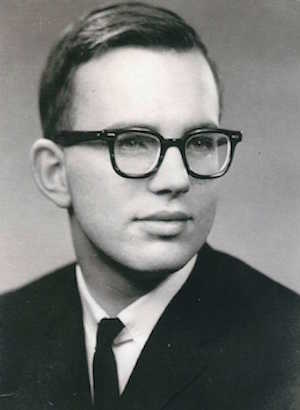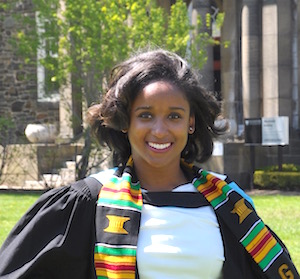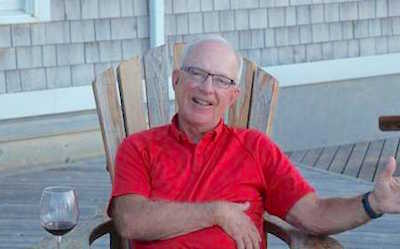 When a 19-year-old Hugh Brown (pictured left) enrolled in Dal’s first MBA program in 1967, there were only about 10 other people in his class, courses were held in houses around campus, and his classmates were all older and had been working. It was a “very folksy” experience, as he now remembers it.
When a 19-year-old Hugh Brown (pictured left) enrolled in Dal’s first MBA program in 1967, there were only about 10 other people in his class, courses were held in houses around campus, and his classmates were all older and had been working. It was a “very folksy” experience, as he now remembers it.
What a difference 50 years makes.
Today, there are about 250 full- and part-time students enrolled in two MBA programs: a Corporate Residency MBA (CRMBA) and a Blended/Online MBA with Financial Services or Leadership specializations. Classes are held in state-of-the-art facilities on campus or wherever there’s an Internet connection, and the majority of full-time students are under 25 and have little work experience, particularly the ones in the CRMBA program.
The difference is more than just the number and age of students or the location of classes, though. The type of education Dal MBA students receive now is dramatically different from the one Hugh Brown received. “30 or 40 years ago, students came to university to obtain information and become educated. Today, those students can get information from many different sources, so they essentially come to university to learn how to analyze information, how to apply it in the real world,” says Iraj Fooladi, a professor in the Blended/Online MBA program who started teaching MBA classes at Dal in 1983.
Dan Shaw, the director of the CRMBA program, agrees, saying there’s much more of a focus now on analytics and data management. There’s also a big difference in the educational backgrounds of students today compared to previous years, he adds. “People are coming from more non-traditional backgrounds; 75-85% have a non-management or commerce undergrad. I would guess that years ago that would have been 50% of the class.”
 Take Marissa Walter (pictured right), for example, a 2017 CRMBA grad and recipient of the Black Business Initiative scholarship. Marissa entered the program with a bachelor’s degree in psychology and she decided on the CRMBA, she says, because she wanted to expand her knowledge base beyond one specific area of expertise and gain more real-world experience. She wanted see what she’d discover.
Take Marissa Walter (pictured right), for example, a 2017 CRMBA grad and recipient of the Black Business Initiative scholarship. Marissa entered the program with a bachelor’s degree in psychology and she decided on the CRMBA, she says, because she wanted to expand her knowledge base beyond one specific area of expertise and gain more real-world experience. She wanted see what she’d discover.
And what she eventually discovered was that she wanted to combine her interest in psychology with what she learned during her MBA. Now she intends to pursue a doctorate in psychology. “It’s interesting that I needed to pursue an MBA to confirm that I actually want to be a psychologist,” she says. “But I know it will all come full circle, because although I ultimately want to work in a clinical capacity, I will also leverage my MBA and combine those skills with counselling and coaching expertise to consult with people in corporate settings.” In the meantime, she has secured a position with a mental health start-up where she will draw on both interests.
Helping students like Walter discover how they can leverage their unique skillset has been a big focus of the CRMBA program in recent years, says Dan Shaw. “We really uncover who that individual is, what their goals are, what their strengths and weaknesses are. And we do testing on them at the beginning—personality testing, emotional intelligence, aptitude—so that they can figure out where they can best use their skills.”
As for the Online/Blended MBA program, the most significant change was introducing the leadership specialization last summer (the financial services specialization has been in place since 1996). Designed for mid-career managers, its four leadership courses focus on the interpersonal skills, the ethics and the attention to sustainability needed to lead organizations.
No doubt change will continue to be a major theme in the MBA programs at Dal in the years ahead. As industry changes, the MBA will need to change to stay relevant, says Shaw.
 And yet, as Shaw and Hugh Brown agree, while taking an MBA is no longer a “folksy” experience, its core teachings won’t change anytime soon. “It teaches you how to organize and establish priorities, it helps you establish valuable contacts, and it gives you time to mature and figure out what you want to do,” says Brown, who went on to an illustrious 40-year career with Burns Fry Ltd. (now BMO Capital Markets). “Certainly the Dalhousie MBA helped me be successful in my chosen career.”
And yet, as Shaw and Hugh Brown agree, while taking an MBA is no longer a “folksy” experience, its core teachings won’t change anytime soon. “It teaches you how to organize and establish priorities, it helps you establish valuable contacts, and it gives you time to mature and figure out what you want to do,” says Brown, who went on to an illustrious 40-year career with Burns Fry Ltd. (now BMO Capital Markets). “Certainly the Dalhousie MBA helped me be successful in my chosen career.”
Recent News
- Two Bachelor of Commerce graduates on the importance of extra‑curricular activities and people skills
- Knowing her worth: Kayler Mutyabule
- Patrick Law: Pivoting cross‑country
- Building on passion: Francesca Hawkes
- Taking it further: Rebecca Osamudiame
- Isioma Oye‑Onwuka: A student profile
- Q&A with Dana Kabat‑Farr
- Himanshu Kumar: A student profile
